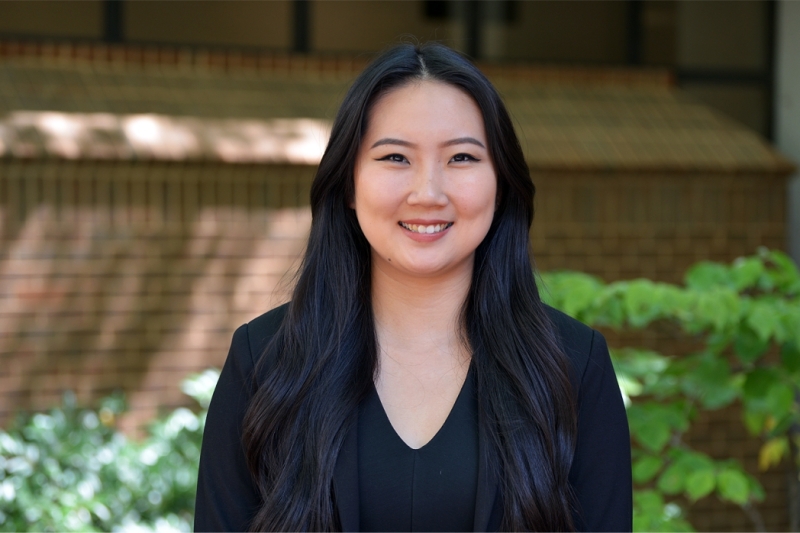Real Practice in the Immigrant Rights Clinic Winni Zhang '24L discusses her work in the Immigrant Rights Clinic, where she has been able handle important legal matters from start to finish.
Winni Zhang ’24L is from Houston, Texas. Prior to law school, she worked as a project manager at the Scholarly Publishing and Academic Resource Coalition and as an executive director of Momentum, an education startup in Houston. During her time at the University of Houston, she was elected as the first Chinese American Student Body President and advocated for additional resources and long-term protections for DACA students. At the end of her term, Winni was awarded the 2017-2018 National Outstanding Student Government Leader of the Year. At W&L, Winni is a staff writer on the Journal of Civil Rights and Social Justice, a member of the Asian Pacific American Law Student Association, a Kirgis Fellow, and a student attorney in the Immigrant Rights Clinic. Winni was born and raised in Houston, Texas.
Why did you choose to participate in this clinic for your 2L year?
I chose to participate in the Immigrant Rights Clinic as a 2L because I have always been fascinated with immigration law. As the daughter of two immigrants and as a strong advocate for immigrant rights, I wanted to thoroughly understand the legal process and systems in place that effect immigration. The opportunity to gain knowledge while helping clients was too good to pass up.
What classes have prepared you to work in the Immigrant Rights Clinic?
The classes that prepared me the most for working in the Immigrant Rights Clinic were legal research and legal writing. Being able to research case law or write memorandums helped me understand issues quickly and effectively advocate for clients.
Describe your schedule with the Immigrant Rights Clinic.
As part of being on a clinic, a student must complete 215 hours of clinic work a semester to satisfy the credit requirements. This translates to an average of 15 hours a week. Some of this was comprised of seminar time, readings, weekly meetings, and meetings with my partner. The rest of the time was working on cases – writing memorandums, filling out applications, phone calls explaining issues with clients, and researching best practices for different issues. On weeks where we planned to file applications for clients, travel to meet clients, or had cases that needed to be processed quickly, the hours could easily reach 20-30 hours. However, the work never felt tiring, and it always felt engaging.
What are some skills you have developed this year?
I developed a lot of skills in the clinic this year with the help of our clinic director. I was able to sharpen my attention to detail, gain confidence in handling matters, learn to break down difficult legal jargon for clients, and navigate questions of ethics in practice.
What surprised you about the work you have done for the Clinic?
Prior to clinic, I was under the impression that we would be a part of cases in a minimal capacity – observing or working on parts of matters. However, a nice surprise and a daunting feeling at first was being able to work on a matter or a case from start to finish with the guidance of the clinic director. It felt scary at first to be trusted with directly meeting with clients without the professor, but eventually, it became easier and less challenging as we conducted more meetings.
What was your favorite aspect of your work with the Clinic?
We were able to go to court over a matter, and it was awesome to see Jack, my clinic partner, represent a client in front of a judge for the first time. We were able to prepare the client for the hearing, draft motions, draft petitions, and more in preparation, which was an invaluable experience.
What was your biggest challenge working in the Clinic?
Being a 2L, I found it difficult on some weeks to balance clinic work and other school related work. Certain time periods like October and February were incredibly difficult when major deadlines/competitions coincided with filing dates. It was easy to compromise work/life balance to accomplish everything on my plate. However, the clinic work was always meaningful work that impacted someone’s actual life, and that gave me energy to power through the difficult times.
Has this experience helped you figure out your post graduate plans, and if so how?
A clinic experience is the closest to real practice you can get. The experience can be even more valuable than a summer experience at a firm because you get to take on a case from start to finish, interact with clients, and most importantly, make mistakes so you can learn. In other ways, it mimics an internship in that you receive mentorship and guidance from your clinic director the way you would a partner/judge, and you also have peer support in your partner and your clinic team. Even though I may not pursue an immigration law path immediately after law school, my clinic experience has been a critical part of my legal education that is applicable to any job I take in the legal field.
 Winni Zhang ’24L
Winni Zhang ’24L
You must be logged in to post a comment.